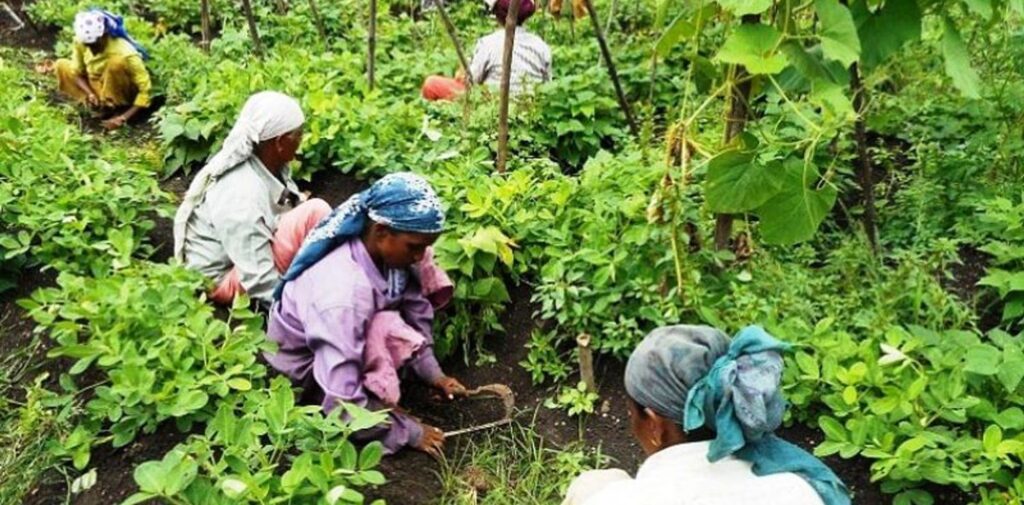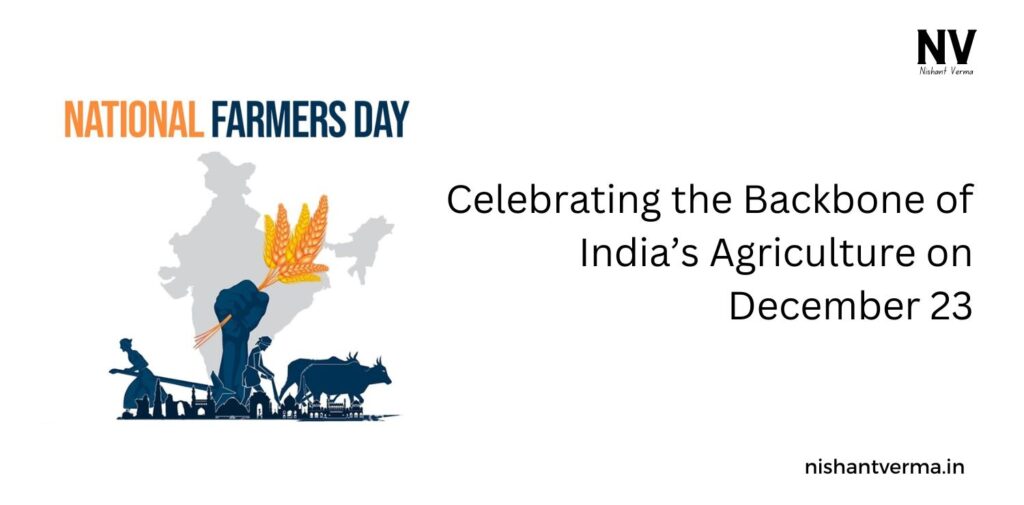In India, agriculture is not just an occupation; it is a way of life for millions of people. The backbone of the Indian economy, farming sustains the lives of a significant portion of the population and plays a vital role in the country’s growth. In recognition of the invaluable contributions made by farmers, India celebrates National Farmers Day (Kisan Diwas) on December 23 every year. This day is dedicated to honoring the hard work, dedication, and sacrifices of farmers who ensure that the country remains nourished, self-sufficient, and prosperous.
National Farmers Day holds special significance in India, where agriculture supports not only the economy but also the social fabric of rural life. It is a day to express gratitude to farmers, raise awareness about their struggles, and highlight the importance of supporting their welfare.
The Significance of December 23:
National Farmers Day is celebrated on December 23 to mark the birth anniversary of Chaudhary Charan Singh, one of India’s most respected leaders and a champion of farmers’ rights. Chaudhary Charan Singh, who served as the Prime Minister of India from 1979 to 1980, was deeply committed to improving the conditions of farmers and strengthening the agricultural sector in the country.
Born on December 23, 1902, in the village of Noorpur, Uttar Pradesh, Charan Singh’s political career was largely centered on issues related to rural development, land reforms, and the well-being of farmers. His advocacy for farmers’ rights and the introduction of policies aimed at protecting their interests earned him a special place in the hearts of India’s farming community. His contributions to the development of agriculture and his relentless efforts to ensure that farmers were treated with dignity are remembered every year on this day.
The observance of National Farmers Day is a tribute to his vision and a reminder of the ongoing need to address the challenges that farmers face in India.

The Role of Farmers in India’s Economy:
Agriculture has been the backbone of the Indian economy for centuries, and despite rapid industrialization, it continues to be a significant contributor to India’s GDP. Over 50% of the Indian population is still dependent on agriculture for their livelihood. The sector provides employment to millions and supports a wide array of allied industries, including food processing, textiles, and retail.
India is one of the world’s largest producers of agricultural products, including rice, wheat, sugarcane, pulses, vegetables, fruits, and spices. The country’s agriculture is highly diverse, with different regions specializing in different crops based on local climatic conditions. While the Green Revolution in the 1960s helped India achieve food security and self-sufficiency, the challenges facing farmers have evolved in recent decades, requiring renewed attention to their welfare.
Farmers play an integral role in ensuring that India’s food supply remains stable and that the nation can feed its growing population. Their hard work, knowledge of the land, and resilience in the face of adversity are essential to sustaining India’s agricultural sector. As the world moves towards a more globalized economy, farmers in India continue to face challenges related to climate change, market volatility, and inadequate infrastructure. National Farmers Day serves as an opportunity to reflect on these issues and explore ways to support farmers in their mission to feed the nation.

Challenges Faced by Farmers in India:
Despite their crucial role in the economy, farmers in India face numerous hardships, many of which are compounded by systemic issues and inadequate support. Some of the key challenges include:
- Financial Stress and Debt: One of the most pressing issues faced by Indian farmers is the overwhelming burden of debt. A significant portion of farmers rely on loans to purchase seeds, fertilizers, and equipment. However, poor crop yields, unpredictable weather patterns, and fluctuating market prices often leave farmers unable to repay these loans, plunging them into cycles of debt. This financial stress often leads to emotional distress and, tragically, sometimes to farmer suicides.
- Climate Change and Unpredictable Weather Patterns: Indian agriculture is highly dependent on the monsoon, and with the changing climate, farmers are facing increasingly erratic rainfall patterns, droughts, floods, and rising temperatures. These climate-related challenges negatively impact crop yields, making farming an even riskier endeavor.
- Inadequate Access to Modern Technology: Although India has made progress in improving its agricultural infrastructure, many farmers, especially those in remote areas, still lack access to modern technology, irrigation systems, and machinery. The absence of these resources hampers productivity and increases dependency on traditional and less efficient farming practices.
- Market Price Fluctuations: Farmers often face significant price fluctuations for their produce, with prices sometimes falling below the cost of production. The lack of regulated markets and price instability makes it difficult for farmers to sustain their livelihoods. Additionally, middlemen often exploit farmers, taking a large share of the profits, while the farmers are left with meager earnings.
- Inadequate Government Support: While various government schemes and subsidies exist to support farmers, many of these initiatives have been marred by inefficiencies and corruption. Furthermore, the lack of effective implementation and timely disbursement of funds means that many farmers are unable to benefit from these schemes.
Celebrating National Farmers Day
National Farmers Day is an occasion to celebrate the immense contributions of farmers and acknowledge their struggles. On this day, various events are organized across the country, including conferences, seminars, and exhibitions, where experts, government officials, and farmers come together to discuss issues related to agriculture. Awareness campaigns and rallies are also held to promote the welfare of farmers and highlight the importance of agricultural reforms.
In addition to government initiatives, non-governmental organizations (NGOs) and farmers’ groups use this day to bring attention to the challenges farmers face and push for policy changes. Several states hold special events to honor local farmers, showcasing their achievements and contributions to agriculture.
For the general public, National Farmers Day is a reminder of the importance of supporting local farmers and appreciating the hard work that goes into producing the food we consume daily. It is also an opportunity to reflect on the ethical implications of our food choices, such as supporting sustainable farming practices and buying locally grown produce.

The Need for Reform and Support:
National Farmers Day is not only about celebrating the past and present contributions of farmers but also about looking toward the future. There is an urgent need for systemic reform to address the ongoing challenges faced by farmers. This includes:
- Improving Access to Credit: Farmers need easy access to affordable credit, and the government must work to ensure that loans are disbursed in a timely and transparent manner.
- Climate-Resilient Agriculture: The government and private sector must invest in climate-resilient crops and technologies, as well as provide training to farmers on sustainable farming practices.
- Price Stability and Fair Markets: Regulating markets and ensuring that farmers receive fair prices for their produce are essential steps to protect farmers from exploitation and price volatility.
- Better Agricultural Infrastructure: Investments in irrigation, storage, and transportation infrastructure will help farmers improve productivity and reduce losses due to poor logistics.
- Increased Awareness and Education: Farmers need access to information about new farming techniques, government policies, and market trends to help them make informed decisions.
Conclusion:
National Farmers Day (Kisan Diwas) is an occasion to honor the farmers of India and reflect on their importance in shaping the nation’s agricultural landscape. It is also a reminder of the challenges they face and the need for comprehensive support systems to ensure that they continue to thrive. On December 23, as we celebrate the legacy of Chaudhary Charan Singh, let us reaffirm our commitment to supporting our farmers and building an agricultural ecosystem that is sustainable, equitable, and resilient for future generations. Farmers are the true custodians of the land, and it is our duty as citizens to stand by them and ensure their continued well-being.




